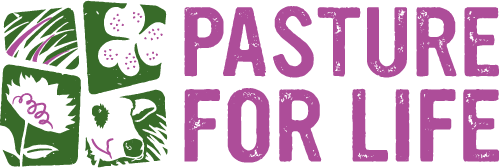Stuart and Rebecca Mayhew, Old Hall Farm 2/3
Encouraging biodiversity and connections across the farm and beyond
The change in farming system from intensive arable to pastoral has enabled us to welcome biodiversity to Old Hall Farm, and Holistic Planned Grazing is the management practice that we have used to keep improving year after year, using the ruminants as tools. Even on the existing arable land we have a fallow period of 12 months (enhanced over wintered stubble) but as we under-sow the arable crops with clovers and grasses, the fallow land is not barren – it’s full of life and the soil is always covered. Instead of using sprays before re-drilling after the 12 months, we use the cattle to graze down very low then direct drill the crop. We are currently conserving the seed from the arable to feed to our chickens but are working towards sowing a crop which can be eaten by humans. Any “straw” or crop residue is baled to use as forage through the winter months.


Longer residual heights of pasture and longer rest periods mean that we are only stocking 5% of the farm at any one time. We are able to use the cattle and sheep to graze in different ways, depending on the needs of the individual paddocks/fields, as well as the requirements of the animals themselves.
In the early days of the conversion of the farm to pasture we had huge problems with thistles and ragwort. Due to persevering with our grazing strategy, we have made huge improvements with both “weeds” without having to resort to spraying or mechanical cutting.
During 2022 and the early part of 2023, we have worked with Norfolk Wildlife Trust to reinstate over 2km of hedgerows. This has enabled the creation of wildlife corridors right across the farm. In time, we hope to introduce more sentinel trees across the farm and entirely new hedgerows which will provide more shelter and shade for the animals. Integrating trees with pasture and arable is very important to us, as we believe in land sharing rather than land sparing. By planting more trees and hedges we can bring the “edge” of the field into the middle of the field, thereby increasing what we call the “edge effect” – more biodiversity above and below ground due to more plant species being present including trees which are the height of plant succession.
Increasing the number of hedgerows will also enable us to make fields smaller which will help with our grazing efficiency in the longer term.
There are several small woods dotted across the farm. We haven’t been able to graze the cattle or sheep successfully in them so far but hope to work on this during 2023. We may also use the pigs as a management tool to disturb the floor of the woodlands and clear the way/introduce more plant species for the ruminants.
With the introduction of so many new trees and hedging plants, deer control will become increasingly important for us. Fortunately there is a strong demand for venison and people are beginning to understand that in order to manage healthy populations of deer we need to become the apex predators.
There are many ponds across the far, and over the last year we have improved four with more work planned for 2023/24.
Benefits to the farm (climate and business resilience)
The farm has never felt more alive than it does now. Despite worsening droughts between 2019 and 2022 the animals have had more to eat both in terms of quantity and quality (which keeps our costs down), and this has not been to the detriment of the wildlife with which we share our space. As the soil is always covered it is cooler, which is beneficial to the soil microbiome. We also not not suffer with water and wind erosion as we do not plough.

Due to ceasing the application of artificial fertiliser any water run off from the farm is cleaner and in recent water testing done within our local catchment group we had the lowest amount of nitrates and phosphates coming off our fields. The consequence of this - if rolled out at scale - is healthier rivers, drinking water, and healthier oceans.
Our involvement with Norfolk Wildlife Trust has brought many more visitors to the farm and we have also visits from other groups such as the NFU and CLA, plus many school farm walks and talks. We also host Open Farm Sunday every year.
Hosting events, whilst sometimes stressful, is the best way to engage with the public (whose food we produce) about farming systems and how it is essential to work more with nature now than it ever has been before.
During 2023 we have plans to host away-days for businesses within Norfolk and Suffolk so it is fair to say that our business resilience is being enhanced by our increased climate resilience – it is allowing us to create new income streams.



